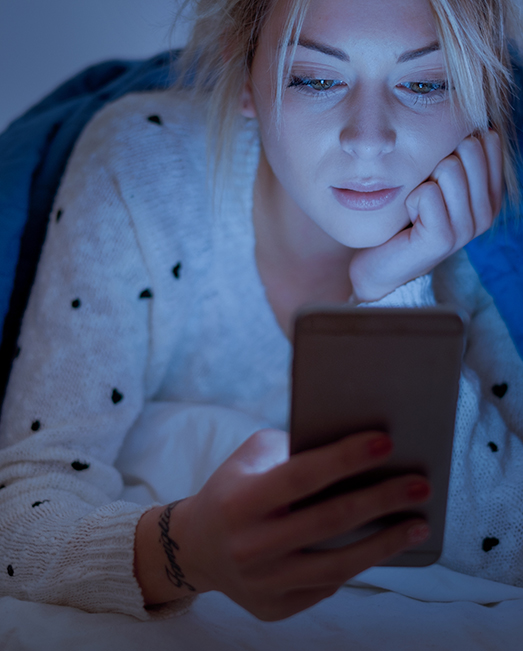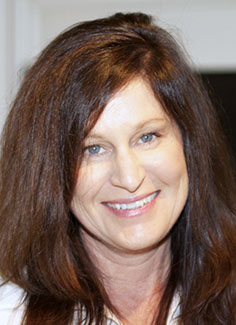Community
Copyright@ Australian Catholic University 1998-2026 | ABN 15 050 192 660 CRICOS registered provider: 00004G | PRV12008
Copyright@ Australian Catholic University 1998-2026 | ABN 15 050 192 660 CRICOS registered provider: 00004G | PRV12008

A close friend approaches to tell you they’re concerned about the health risks of using their mobile phone. You’re a trusted mate, and they’re keen to hear your opinion about the safety of their device. “I’m no expert,” you say to your friend, “but let me do some research and get back to you.”
If you’re like most people, at this point you’d head straight to Google, typing something like “mobile phone health risks” into the search bar. This would give you some 400 million sources of information on mobile phones and health; however, even within the top 10 results, the info is inconsistent. Some entries say there’s no established scientific evidence that the use of mobile phones comes with health risks. Others claim that research has shown significant adverse effects – including brain cancer.
So, which source of information would you rely on, and why? How would you know that the info is trustworthy?
These questions were put to a cohort of Australian middle school students who participated in newly published research led by ACU's Laura Scholes, Associate Professor at the Institute for Learning Sciences and Teacher Education.
Titled ‘Many truths, many knowledges, many forms of reason’, the study included a scenario similar to the one above, requiring the participants – aged 13 and 14 – to explore the health risks associated with mobile phone use. One-on-one interviews were conducted to elicit their responses to the situation, enabling the researchers to explore student approaches to sourcing and evaluating information online.
“This is a crucial period of schooling, when students tend to go from mostly reading narrative storybooks to reading informational texts across the curriculum, and that requires different skills,” says Associate Professor Scholes, whose research has focused on literacy, reading in the digital age, and the development of critical thinking.
“At this age, the expectations on students start to rise, and a lot of the time they don’t have the sophisticated skills required to evaluate conflicting accounts on complex issues, especially when they’re gathering information on digital platforms.”
In an era when the internet is a ubiquitous part of our lives, and when many teenagers are almost constantly online, it would be easy to assume that they’d trust information sourced in the digital realm.
And yet, more than half of those who took part in the study expressed mistrust of the internet. Several students labelled it as “unreliable”, conveying a belief that online sources like Google, Wikipedia and the like were tenuous and biased.
It might be argued that this level of scepticism of the internet is healthy. The problem, says Associate Professor Scholes, is that it fails to appreciate the breadth of reliable information available online.
Take Wikipedia, which many students are discouraged from using as a research tool. Despite teething problems in its early years, the website – created around the notions of consensus and collaboration – has grown to become an increasingly reliable source. It has been described by some as “the last good place on the internet”, but many students raised doubts about its reliability.
“If it’s Wikipedia, it’s obviously not reliable because anyone could write it,” said Dylan, one of the students surveyed.
Another, named Cara, said it could “really easily [be] hacked and there are lots of opinions that are really different”.
Students appeared to have little knowledge of the checks and balances that Wikipedia has in place to combat misinformation.
“We got the feeling the students were saying what they thought they should say, which in this case was ‘Don’t trust Wikipedia’, even though it is now highly regarded as a prominent information resource by many professionals,” says Associate Professor Scholes, who co-authored the study alongside Dr Sarah McDonald, Dr Garth Stahl, and Professor Barbara Comber.
“These might just be messages they’re getting in a school context, because teachers are warning students about misinformation and disinformation online, so it could be that they’ve internalised concerns about the falsehoods and competing theories that infiltrate the internet.”
Student doubts about the reliability of digital sources extended to news websites, with one participant saying that online journalists could “say whatever they want”.
Rather than relying on the internet for the “right” information, these students opted to defer to adults – parents, teachers, scientists, and experts – whom they considered more trustworthy.
Josie suggested she would “not go into Google ‘cause Google’s not always right”. Instead, she would seek information from “someone [whose] job is to help people with stuff like this … someone like a school helper maybe”.
This reliance on adults as a single source of truth could also be problematic, says Associate Professor Scholes, because it suggests that students aren’t engaging in self-guided critical thinking.
“Just blindly taking one person’s opinion as fact is incredibly problematic, even if that person is a scientist,” she says.
“Many of these students don’t appreciate that the body of scientific knowledge is continually evolving – it’s not just fact, it’s a constant questioning and re-examining of evidence to gain new knowledge.
“If you just believe that everything is true or false, black and white, then you’re more likely to simply accept what one person says, and having one person presented as the source of all truth is dangerous.”
This can be particularly perilous when the individual presented as the ‘guru’ has controversial views or questionable motives.
“We’re seeing huge problems with influencers like Andrew Tate, who is sharing his misogynistic perspectives about life and women and what it means to be a man,” says Associate Professor Scholes, adding that, due to the confirmation bias of the algorithm, social media users would quickly be offered accounts with similar perspectives.
“We have boys hooking up to his social media, and the next search they do, they’ll be bombarded with ads about muscles and steroids or get led to another site with similarly toxic views around masculinity. Without the skills to evaluate the credibility of this information, teenage boys and young men can be easily manipulated.”
An alarmingly small proportion of the students involved in the study – a mere 15 per cent of those interviewed – had appropriate strategies to evaluate and identify credible sources of online information
These students showed a greater level of trust of the internet and appeared more comfortable engaging with online platforms.
Take Tom, who displayed an understanding that experts could have differing views on a given issue, and that it could be useful to consider these varied perspectives.
While around a third of the students said content could be relied upon when repeated in multiple online sources, Tom took it further, using critical thinking to make judgments about what is “actually good” information.
“I’m gonna go on quite a few of them, see which ones come up the most, and I’d also go off what I think as well,” Tom told the researchers. “Like if I think it’s actually good or if it’s a stupid idea.”
Once surveying a range of views, he would “probably tell the friend the different points of view … that could all be helpful and right”.
Others, like David, placed more weight on the credentials of the author or website he gathered the information from.
“I would not go to personal sites and if I did go to scientists’ sites I would compare all of them to see if there’s a variable,” he said. “If you generally know the company or person or scientist who made it, if you know them well and you trust them then yeah, that would be reliable. I generally trust .gov and .org sites … I believe that it is educational not a fake website.”
The ability to effectively navigate the online environment and assess the reliability of information “comes down to critical thinking and deep, evaluative reading”, says Associate Professor Scholes.
Regrettably, her research indicates that many teens are lacking these skills. She cites a recent book she co-authored with Professor Kathy Mills and Professor Len Unsworth showing that young people are not engaging with online sources in a sophisticated manner; rather, they skim, scroll and scan online text for keywords, and are often distracted by hyperlinks, popups, alerts and notifications.
“Kids are on their devices constantly and that can be overwhelming and lead to cognitive overload,” she says. “They’re struggling to cope with the amount of information they’re consuming, and that suggests that the digital age is posing complex challenges for both students and teachers.”
Associate Professor Scholes and her colleagues argue it’s crucial that educators are supported to teach students how to critically evaluate digital content, and that this is done from an early age.
“The nature of reading has changed so much, and that change calls for a radical re-think and a new understanding of literacy,” she says.
While some online information is unreliable, the internet also contains a mountain of credible info on any topic – from the risks of using your mobile phone, to climate change and the safety of vaccines.
“We need to teach reading skills that are underpinned by a sophisticated interpretation of content, making inferences and judgments and justifying reason. If young people can apply the right skills when using the internet as a source of information, there’s just so much potential in it.”
Laura Scholes is an Associate Professor researching literacy in the digital age at ACU’s Institute for Learning Sciences and Teacher Education. She focuses on gender and literacy, reading in the digital age, the development of critical thinking, and student learning in diverse contexts.

Copyright@ Australian Catholic University 1998-2026 | ABN 15 050 192 660 CRICOS registered provider: 00004G | PRV12008